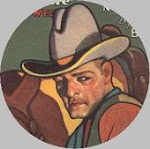
Max Brand, the most famous pseudonym of Frederick Faust, made his fictional Wild West an arena for the characters of myth and legend to live and battle again. While Owen Wister (in The Virginian) and Zane Grey (in Riders of the Purple Sage and many other novels) made the West an epic landscape for romantic heroes to ride across and populate, Brand released the mythic urge that dwells within the finest storytellers and placed demigods on a timeless western landscape of no particular place that he used again and again.
It began with his first western novel, The Untamed, which first appeared as a six-part serial in All-Story magazine, starting in its issue dated Dec. 7, 1918. The story's popularity ensured its publication in book form, and Tom Mix starred in the silent movie based upon the novel.
Here is the opening paragraph of The Untamed, which introduces the otherworldly setting that would serve as Faust's Wild West:
"Even to a high-flying bird this was a country to be passed over quickly. It was burned and brown, littered with fragments of rock, whether vast or small, as if the refuse were tossed here after the making of the world. A passing shower drenched the bald knobs of a range of granite hills and the slant morning sun set the wet rocks aflame with light. In a short time the hills lost their halo and resumed their brown. The moisture evaporated. The sun rose higher and looked sternly across the desert as if he searched for any remaining life which still struggled for existence under his burning curse."
Faust wrote hundreds of novels and stories set in this mythic western wonderland. Westerns weren't all that he wrote. He published mysteries, historical sagas, and basically invented the medical story when he created Dr. Kildare. His prodigious production of popular fiction marked him as larger than life, not so different from the characters he created on paper.
Like many of his larger-than-life characters, Faust was a man of contradictions. Greatly popular under many pen names for his fiction, Faust's greatest desire was to gain renown under his actual name for his classically styled poetry -- yet this work never found an audience. Prevented from serving in the Army because of his damaged heart, Faust poured his energies and desires for a life of adventure into the protagonists that peopled his stories.
Each year, new books appear in print based on Faust's pulp writings. His imagination continues to grip new readers generation after generation, like that of Louis L'Amour.
Max Brand is one of my favorite western writers. His works don't neatly fit into the category of traditional western, but they define and fill a niche all their own -- perhaps a subgenre of traditional westerns, if you will. I know from conversations with many other readers that Faust's westerns don't satisfy every reader, but their idiosyncratic characteristics make them classics of the field. I'm not even sure someone could find a publisher today for a new western of the type Faust wrote. Perhaps that's a good reason to be glad Five Star, Dorchester and other publisher are keeping Max Brand westerns in print today.
You can find a selection of Max Brand's westerns at The Spur & Lock Spinner Rack.






3 comments:
I've never read anything by Faust, although I do have a couple of his books and after reading this post I think I'll be hunting them out real soon.
A great post - I know the MAX BRAND name so well, everyone does, but this gave me some new information. Thanks.
Faust lived a somewhat larger-than-average life himself, and poured a lot of that energy into his novels and stories. He was probably one of the best-paid pulp writers -- if not by the cents per word, certainly at least because of his word counts: He wrote prodigious amounts at a hurricane pace. And he spent as fast as he earned, living for a time in Italy in a villa to which he had added a pool and tennis court; he wrote through the day, then had parties with visiting literary figures during the night hours. All, seemingly, in defiance of what had been diagnosed as his weak heart.
Post a Comment